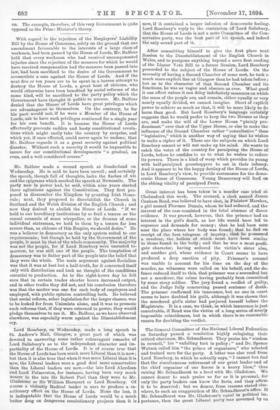With regard to the rejection of the Employers' Liability Bill
by the House of Commons, solely on the ground that one amendment favourable to the interests of a large class of workmen, had been passed by the House of Lords, Mr. Balfour held that every workman who had received uncompensated injuries since the rejection of the measure for which he would have received compensation had the measure been passed into law, had been sacrificed to the desire of the Government to accumulate a case against the House of Lords. And if the next five or ten years are to be spent in a barren attempt to destroy the House of Lords, a great host of citizens, who would otherwise have been benefited by social reforms of the same kind, will be sacrificed to the party policy which the Government have thought it politic to pursue. Mr. Balfour denied that the House of Lords have great privileges which are advantageous to themselves. On the contrary, he for his part would not, if he were a Member of the House of Lords, ask to have such privileges continued for a single year for his own benefit. It is because the House of Lords effectually prevents sudden and hasty constitutional revolu- tions which might easily take the country by surprise, and which yet, if once effected, could never again be undone, that Mr. Balfour regards it as a great security against political disaster. Without such a security it would be impossible to insure for our constitutional developments "a gradual, an even, and a well-considered course."


















































 Previous page
Previous page